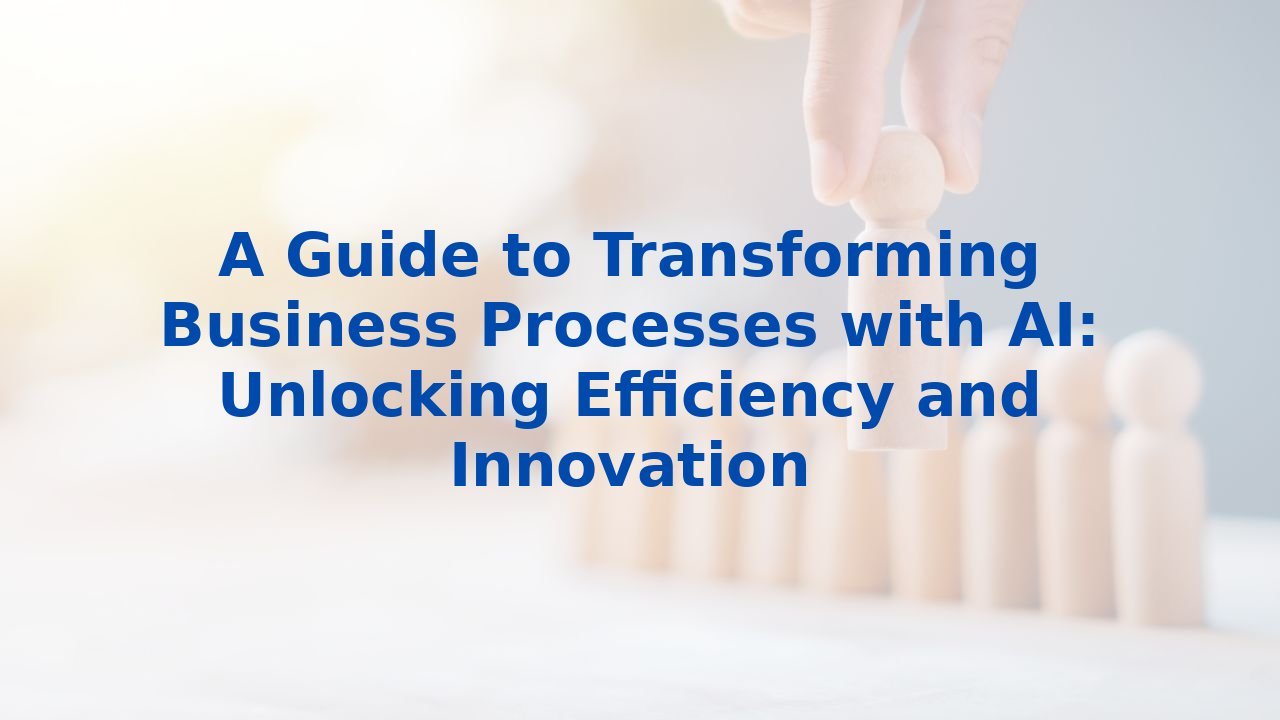A Guide To Transforming Business Processes With AI: Unlocking Efficiency and Innovation
Enhancing Business Processes with AI: A Comprehensive Guide
Introduction
In today's fast-changing business landscape, organizations continuously seek innovative ways to boost efficiency, cut costs, and improve decision-making. Enter Artificial Intelligence (AI)—a disruptive technology that holds the key to transforming business processes and unleashing new levels of productivity. This guide will unpack how AI enhances process discovery, mapping, automation, and improvement, revealing the myriad advantages it offers organizations in their quest for operational excellence.
Process Discovery: Unveiling Hidden Efficiencies
Have you ever wondered how many inefficiencies lie buried within your organization? AI-driven process discovery provides clarity and insight through advanced data analysis. Unlike traditional methods focused on employee interviews and manual data digging, AI excels at identifying patterns, workflows, and relationships by sifting through massive datasets at lightning speed. This powerful technique, known as process mining, offers a comprehensive view of how data flows through your systems, illuminating hidden opportunities for optimization.
Process Mapping: Creating a Blueprint for Success
Once inefficiencies are identified, the next step is to visualize them. AI process mapping takes the insights gleaned from the discovery phase and translates them into clear, actionable blueprints. Utilizing machine learning and data analytics, AI not only illustrates how processes interconnect but also reveals where bottlenecks exist. This clear visualization keeps your process documentation up-to-date and ensures all stakeholders grasp the organizational workflows, paving the way for meaningful improvements.
Process Automation: The Workhorse of Efficiency
Among AI’s most practical applications in business process management is automation. Robotic Process Automation (RPA), powered by AI, excels in handling repetitive, rule-based tasks that once consumed countless hours of human effort. Whether it’s data entry or responding to customer queries, AI-driven automation can operate tirelessly, 24/7, with unmatched precision. The result? Enhanced efficiency as human talent shifts from mundane tasks to more strategic endeavors, fostering creativity and innovation.
Process Improvement: The Path Forward
AI shines brightest when it comes to continuous improvement. By leveraging ongoing feedback, data-driven insights, and performance metrics, organizations can foster a culture of iterative enhancements. This iterative process allows businesses to adapt their strategies in real-time, ensuring they remain aligned with their objectives and industry standards. Ultimately, it creates an agile environment where growth and improvement are not just goals but ingrained practices.
Benefits of AI for Business Process Management
AI unlocks a multitude of benefits for organizations looking to optimize their processes:
- Improved Efficiency: By automating routine tasks, AI alleviates manual workloads and minimizes human error, allowing employees to channel their energy into strategic projects.
- Enhanced Decision Making: With its ability to provide predictive recommendations based on data patterns, AI empowers better business decisions, enabling analysts to foresee the ripple effects of changes.
- Real-Time Monitoring: AI facilitates real-time oversight of processes, enabling timely detection of deviations and risks. By addressing potential issues promptly, organizations enhance both quality and reliability.
- Data Analysis: AI accelerates data analysis, revealing trends and automating manual tasks. The result is sharper, more informed tactical and strategic decision-making.
Training Employees for AI: A Crucial Step
While AI is indeed a game-changer, its full potential can only be harnessed through deliberate employee training. Here’s why empowering your workforce matters:
- Understanding AI Capabilities: When employees comprehend both the capabilities and limitations of AI, they can leverage AI tools more effectively within their daily operations.
- Developing AI Skills: Training in relevant skills—data analysis, machine learning, and process automation—ensures that staff members are well-equipped to navigate AI-driven innovations.
- Adapting to Change: Preparing your workforce for AI-induced changes helps them embrace new tools and strategies, facilitating seamless transitions and reducing resistance to change.
Conclusion
AI is setting the stage for a revolutionary shift in business process management, enhancing efficiency, improving decision-making, and fostering continuous improvement. By capitalizing on AI for process discovery, mapping, automation, and improvement, organizations position themselves to streamline operations, minimize costs, and maintain a competitive edge. Equally important is training employees in AI to ensure they understand and utilize these transformative tools effectively. When organizations embrace AI holistically, they pave the way for sustainable growth and optimal operational excellence.



